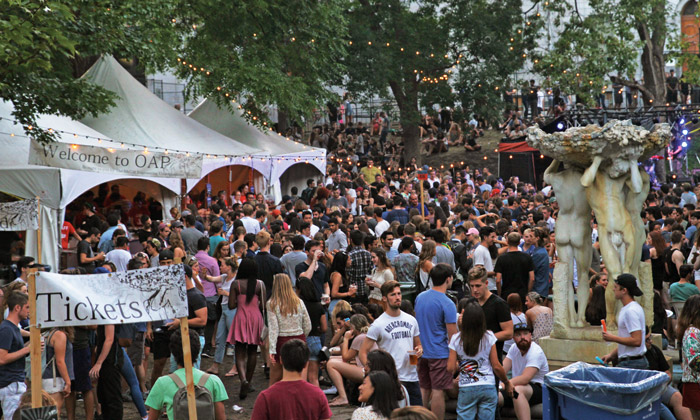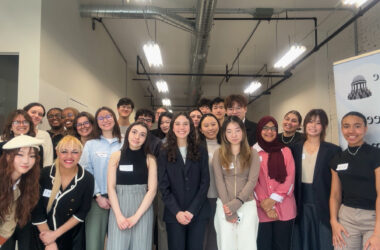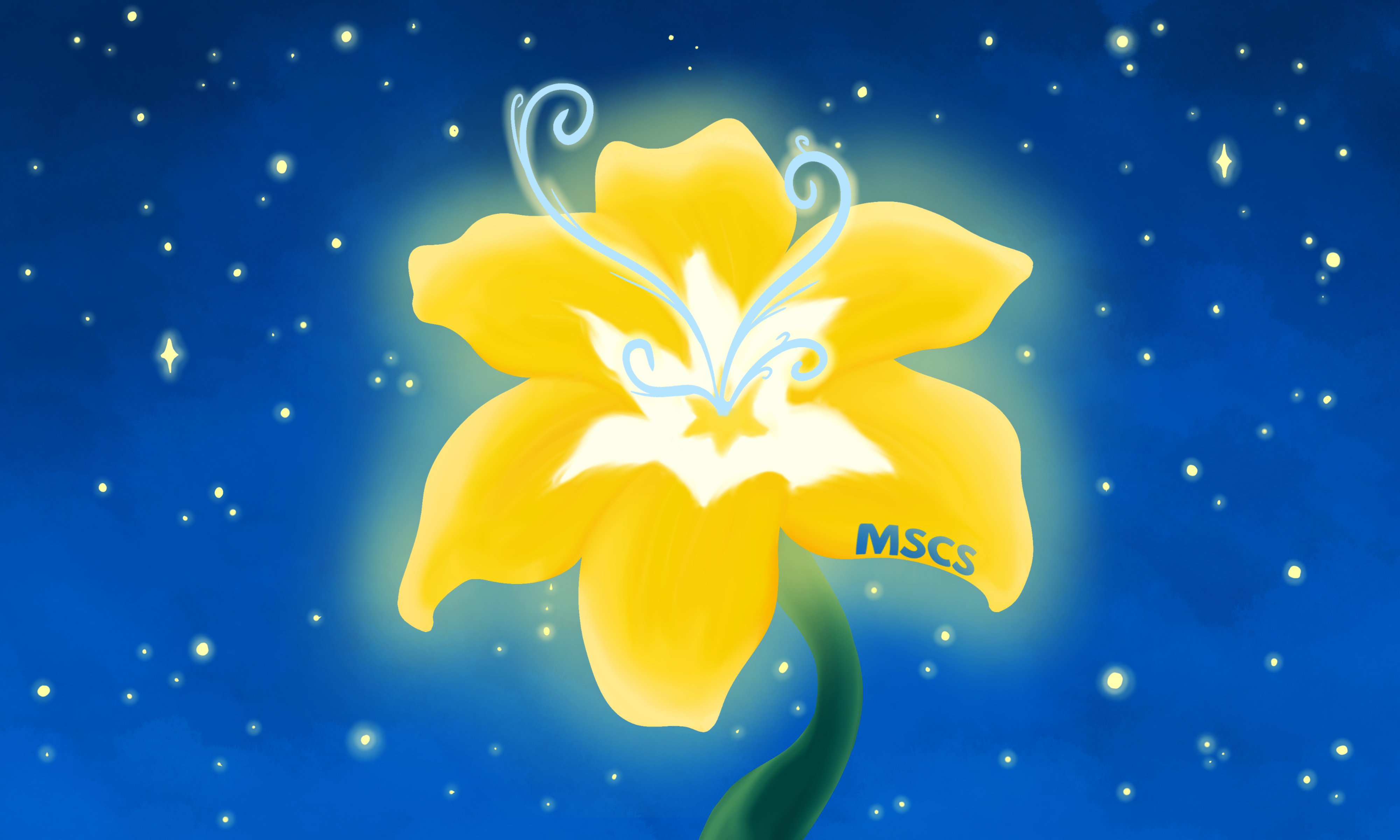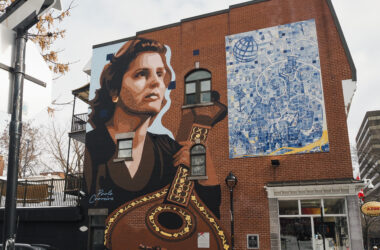For nine days in Sept. and two days in April, a new energy visibly courses through McGill’s campus. Any passerby on Rue Sherbrooke is likely to hear the faint echo of students laughing, the thrumming bass of the year’s resident student band playing jazz or top 40 covers, and the smell of barbecue wafting through the air. However, no McGill student is a stranger to the event that so dramatically alters this little campus. Some call it Open Air Pub (OAP), most call it “The Best Place on Earth,” but, once-upon-a-time, a group of engineering students just called it a barbecue with some friends.
Ashkaan Mohtashami, U4 Engineering and OAP manager, recalls one day three years ago, when he serendipitously met the founders of OAP.
“It was a Thursday around 8 p.m., and these two guys, around fifty years old, come by wearing dress shirts and looking very proper, and they asked us what was going on. We told them it was Open Air Pub and they were like ‘Oh…Oh we started that,” Mohtashami recalled.
“I believe it was 1982, the first year they did it. It was nothing like what we have now; it was just a couple of engineers who wanted to have a barbecue, so they brought a propane grill, and a cooler full of beers, and just chilled in the park.”
Since its inception in 1982, the idea behind OAP has remained the same: Beers, burgers, friends, good music, and completely ruining a designated patch of grass. Today, however, the event occurs on an almost unrecognizable scale. With upwards of three thousand people coming through OAP on an average day, the event consistently rakes in astronomical profits for the Engineering Undergraduate Society (EUS). The profits from OAP in the Fall are more than enough to sustain the event.
“Last year we made [90] thousand dollars in profits, and this past OAP lite we made 30 grand,” Mohtashami said. “Five grand goes to OAP for the next year, and everything else goes back to EUS. Then, it’s split between the Clubs Fund and Engineering design teams. In the spring, the profits from OAP lite are donated to the President’s Choice Children’s Charity.”
This charitable donation fosters OAP's relationship with Provigo, the main retail distributor of President's Choice brand goods, who, along with Sleeman, are OAP's regular sponsors. Sponsorship aside, OAP’s high profits are in large part due to the mass amounts of alcohol McGill students are capable of consuming.
“For OAP lite this past year, we [sold 627] cases [of beer],” Mohtashami said, “I think it was a new record of cases sold. That’s almost 20 thousand beers […] just in one day! Its impressive—and kind of disgusting when you think about it—but mostly impressive to us.”
It is no surprise that OAP is able to sell such a large quantity of alcohol when so many students are liable to stay there from opening to dusk. The annual barbecue has garnered such a cult following that students rush to occupy tables, and pride themselves on remaining there all day. For most, however, this commitment slowly dwindles after graduation, and OAP recedes to a distant fond memory. On the other hand, for John “the dungeon master” Boisvert, a technician working for the Engineering Department at McGill, OAP has become a lifelong commitment.
Boisvert has been volunteering—for lack of a better word to describe his dedication—with OAP for 26 years. Students have probably seen this white-bearded legend behind a grill, or dutifully cleaning used cups off tables; however, once upon a time, John was just a technician working in the basement of McConnell Engineering—oblivious to the barbecue that would come to occupy such a large part of his life.
“The first time I heard about Open Air Pub was in 1990, when three engineering students came down to the [mechanical] lab and asked if I could get them a sink,” Boisvert recalled. “They said […] ‘We’re having a little barbecue outside and a health inspector came around and said that if we don’t have a sink by 2 p.m., they will shut us down.’”
In those days, OAP volunteers cut their own lettuce, tomatoes, and onions, but they didn’t have a sink to wash the vegetables or their hands.
“I said, ‘Oh ok, you’ll have your sink by 1 p.m.,’” Boisvert explained. “By 12:30, I was wheeling it out here, and lo-and-behold this ‘little barbecue’ was like, ‘Holy crap! What the hell is going on here?’”
Ever since the fortuitous incident, Boisvert has dedicated himself to helping students run OAP.
“A lot of times when I go out to pick up cups, people will see me,” Boisvert said, pointing to his long white beard. “They’re young, they think, ‘Oh! What’s he doing here?’ Some of them will try and give me tips for cleaning off their table and stuff, and they say, ‘Here, go buy yourself a beer.’ I tell them, ‘I don’t need that, I’m a millionaire!’”
What those charitable, albeit misguided, students are unaware of is that John is the veritable backbone of the OAP production, as well as the repository of its entire evolutionary history. He can tell you about the time a homeless man burnt the bar down in 1996, about how OAP staff used to build their own beer shack every year with a different theme, or about the time the Barenaked Ladies played on the stage in the 90s. However, when asked for his favourite OAP memory, he became uncharacteristically mum.
“It’s an illegal memory!” Boisvert whispered.
With some prompting, he admitted that the memory from before 1996, when he discovered that an OAP manager was selling hard liquor on the side.
“He built a little shack between those two trees [in Three Bares Park]. A speakeasy. He had his own little house on campus,” Boisvert said. “No one found out ever, he was living there because in those days we didn’t have this fence or security.”
Though Boisvert will be retiring from his position as a technician with McGill this coming year, this is certainly not the end of his time with OAP.
When asked if he would be returning next fall, Boisvert replied, “Oh god yes… this is the best place on earth to be.”
An earlier version of this article incorrectly stated that Open Air Pub (OAP) receives annual donations of burgers from Provigo and Sleeman. Similarly, an earlier version of this article incorrectly stated that OAP sold 620 cases of beer in Fall 2016, when in fact they sold 627. Finally, an earlier version of this article stated that OAP made a profit of 72 thousand dollars in Fall 2015, when in fact, they made a profit of 90 thousand dollars. The McGill Tribune regrets these errors.










According to Michael Kratsios’ very well-researched article “The Evolution of the McGill Engineer,” the first OAP was during the 1979–1980 school year. It’s pretty well documented in the McGill publications archived at the library, and he even found some pictures from the first OAP, which was earlier than these people say it was. I like how trusting our reporters are, though. Maybe in a few years I can come back and claim I invented OAP, and they’ll put me in an article, too.
Thats my article! haha nice to see it hasnt been forgotten yet. Ya if you look in the 1979-1980’s year book you can actually find a picture with a large banner that clearly rights OAP on it with a couple of tables in 3 bares parc. When writing that article I also spoke with Larry Lesssard one of the mech eng profs here at mcgill. He was an active engineering undergrad at mcgill in the late 70’s and so was there for the very first few OAPs. At the time of my article he was out of the country and so was only able to send me the 1 or 2 pictures from the first few OAPs that he happen to have on his laptop, but he also mentioned that he had a bunch of pictures in actual photo albums back home. He seemed very happy to help me out, if anyone is interested in finding out more about OAPs origins I’m sure he’d be happy to help.